

Disappearing mothers. Why would a woman put a picture of her child’s face – instead of her own – as her profile picture on Facebook?
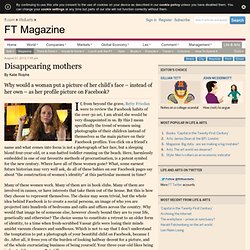
©Salem Krieger If, from beyond the grave, Betty Friedan were to review the Facebook habits of the over-30 set, I am afraid she would be very disappointed in us. What Is Character? Debunking the Myth of Fixed Personality. Why We Cry: The Science of Sobbing and Emotional Tearing. By Maria Popova Why it’s easier to prevent a crying spell than to stop one already underway.
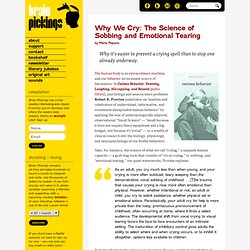
The Self Illusion: How the Social Brain Creates Identity. Limits Of The Human Body: How Much Sleep Deprivation, Radiation & Acceleration Can We Survive? By: Natalie Wolchover Published: 08/13/2012 09:21 AM EDT on Lifes Little Mysteries One hears epic accounts of people surviving bullets to the brain, 10-story freefalls or months stranded at sea.

But put a human anywhere in the known universe except for the thin shell of space that extends a couple of miles above or below sea level on Earth, and we perish within minutes. As strong and resilient as the human body seems in some situations, considered in the context of the cosmos as a whole, it's unnervingly fragile. Many of the boundaries within which a typical human can survive have been fully established; the well-known "rule of threes" dictates how long we can forgo air, water and food (roughly three minutes, three days and three weeks, respectively).
Other limits are more speculative, because people have seldom, if ever, tested them. Experiments over the decades — some intentional, others accidental — have helped stake out the domain within which we, literally, live. Study: Proof That We Sexually Objectify Women - Lindsay Abrams. We look at women the same way we look at houses and sandwiches: as composites of attractive parts.

Jason Lee/Reuters PROBLEM: Few would argue that the objectification of women is a real thing -- and a real problem -- but as yet there's been no cognitive explanation for it in a literal sense. Do we really look at women differently than we do men, and are they actually objectified in the eye -- and brain -- of the beholder? METHODOLOGY: Images of average, fully clothed individuals (read: no supermodels in bikinis) were quickly flashed before the eyes of participants. After each one, the participants would then be shown two side-by-side images that zoomed in on one, "sexual" aspect of the individual (for example, a woman's midriff) and asked to identify the version that hadn't been modified. RESULTS: Regardless of gender, participants consistently recognized women's sexual body parts more easily when presented in isolation.
Top five regrets of the dying. There was no mention of more sex or bungee jumps.
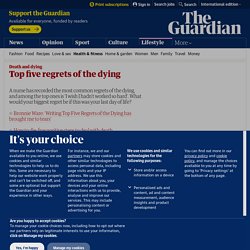
A palliative nurse who has counselled the dying in their last days has revealed the most common regrets we have at the end of our lives. And among the top, from men in particular, is 'I wish I hadn't worked so hard'. Bronnie Ware is an Australian nurse who spent several years working in palliative care, caring for patients in the last 12 weeks of their lives. Wired for Culture: How Language Enabled "Visual Theft," Sparked Innovation, and Helped Us Evolve.
Benefits Of Early Risers - John Farrell. What Does It Mean to Be Human? By Maria Popova Primates, philosophers, and how subjectivity ensures the absolute truth of our existence.
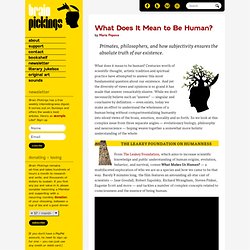
What does it mean to be human? Centuries worth of scientific thought, artistic tradition and spiritual practice have attempted to answer this most fundamental question about our existence. And yet the diversity of views and opinions is so grand it has made that answer remarkably elusive. While we don’t necessarily believe such an “answer” — singular and conclusive by definition — even exists, today we make an effort to understand the wholeness of a human being without compartmentalizing humanity into siloed views of the brain, emotion, morality and so forth.
From The Leakey Foundation, which aims to increase scientific knowledge and public understanding of human origins, evolution, behavior, and survival, comes What Makes Us Human? There is a lot more biology to our behavior than we used to think.” ~ Richard Wrangham Share on Tumblr. Millennial Women Are Burning Out At Work By 30... And It's Great For Business. How Emotional Equations Can Change Your Life. How Family Violence Changes the Way Children's Brains Function - Esther Entin - Health. In much the same way that combat affects a soldier, violence causes a kid's natural alarm and response system to become too sensitive.

Family violence affects the brains of children in much the same way combat affects soldiers, according to a recent study. The research found that chronic stress in children's lives affects their stress response systems -- in particular, two specific areas of the brain, the amygdala and the anterior insula (AI). Our body and brain are designed to recognize and react to threats to our well-being.
This is an important capacity to increase our survival in adverse circumstances. But what happens when these alarm and response systems become over-sensitized as a result of chronic, or long-term stress? 7 Essential Books on Optimism. By Maria Popova What the love of honey has to do with ancient wisdom, our capacity for hope, and the future of technology.

The Quest for the Origin of Altruism: The Tragic Story of George Price. By Maria Popova From Darwin to Skinner, or what vampire bats have to do with amoebas and random acts of kindness.

Where does true altruism come from? Does it really exist? Human Development Index: Deconstructing development. I Married You for Happiness — By Lily Tuck — Book Review. What Is a Person? By Maria Popova What remix culture and philosophy have to do with personhood in the age of synthetic biology.
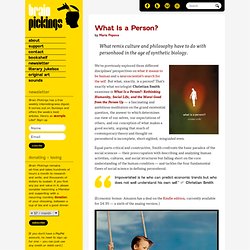
We’ve previously explored three different disciplines’ perspectives on what it means to be human and a neuroscientist’s search for the self. But what, exactly, is a person?